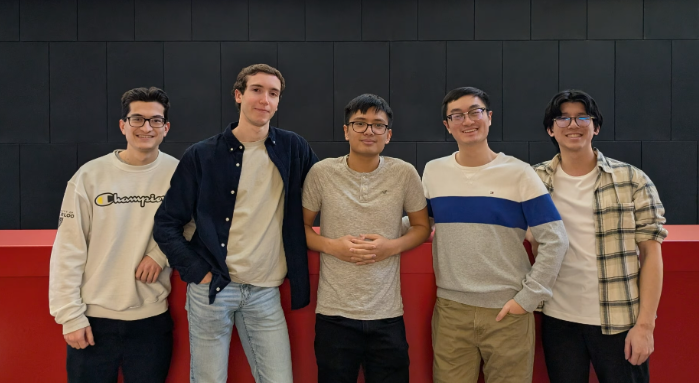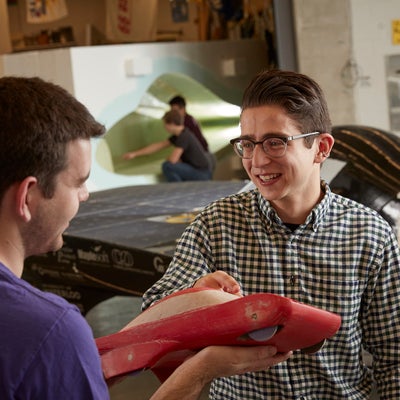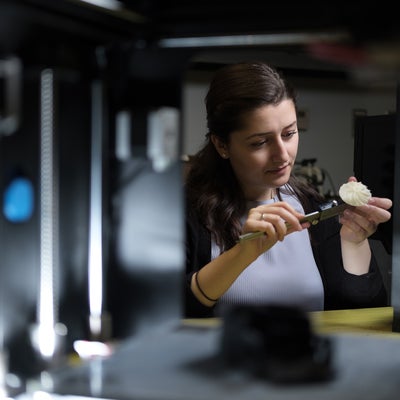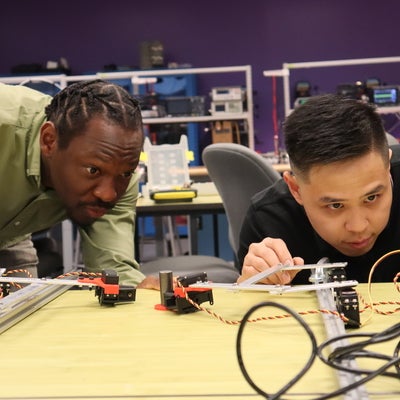Why Systems Design Engineering?
Solving engineering problems always involves the modification or creation of systems. In this program, you’ll examine ecological, transportation, physiological, energy and communication systems and through specialized courses, you’ll learn to develop innovative solutions to the problems you uncover.
Our Systems Design Engineering program is a multidisciplinary program that integrates engineering, design and human factors to create innovative solutions to complex problems. This program is designed to develop engineers who can think holistically, considering the interactions between various system components, and who are equipped to work in diverse fields ranging from robotics and biomedical engineering to environmental systems and artificial intelligence. Central to the program is the emphasis on design. You'll engage in numerous design projects throughout your studies, learning to apply design thinking and systems methodologies to real-world challenges.
Courses in Systems Design Engineering
In your first year, you'll take foundational courses exploring subjects such as design, systems, computation and human factors in math and computation to give you the base for your upper-year classes. You will develop design-thinking skills by engaging in design workshops. Often working in teams, you will learn to implement solutions by creating, testing and evaluating prototypes – everything from robotics to user interface design and complex systems, including energy and transportation.
Sample first-year courses
This is a sample schedule. Courses are subject to change.
| Fall Term (September to December) | Spring Term (May to August) |
|---|---|
Upper year courses
For information about courses past your first year, check out the Undergraduate Academic Calendar.
Customize your degree with options and specializations
Options
Options are a way to provide you with a path to expand your degree and get a secondary emphasis in another subject or area. Students should decide if they are interested in taking options as they enter second year. Some available options are:
Specializations
A specialization is recognition of selected elective courses within your degree. Specialization offerings are unique to your engineering program and are listed on your diploma. Specializations that are available to Systems Design Engineering students include:
Co-op for Systems Design Engineering students
You’ll have an unrivalled opportunity to gain paid work experience before you even graduate. We’ll help you navigate job applications, résumés, and interviews; you’ll have the added benefit of trying out different roles and/or industries to find the one that fits you while building your work experience and reinforcing your in-class learning out in the real world. It all adds up to a competitive advantage after graduation.
Starting in first year, you'll normally alternate between school and work every four months, integrating your classroom learning with real-world experience. You can return to the same employer for a couple of work terms to gain greater knowledge and responsibility or work for different employers to get a broad range of experience.
| Year | September to December (Fall) | January to April (Winter) | May to August (Spring) |
|---|---|---|---|
| First | Study | Study | Co-op |
| Second | Study | Co-op | Study |
| Third | Co-op | Study | Co-op |
| Fourth | Study | Co-op | Co-op |
| Fifth | Study | Study | - |
Your first work term will be halfway through first year. Learn more about co-op.
Example co-op positions for Systems Design Engineering students
- Product design/development
- Rapid prototype software developer
- Product manager
- User experience designer
- Application developer
- Control systems software designer co-op
- Machine learning developer
- QA analyst
- Automation engineer
- Systems software engineer
Download complete: Six co-op terms as a Systems Design Engineering student
Andrei, Systems Design Engineering student
Andrei (he/him) is in his fourth-year of Systems Design Engineering. He delves into detail about his experience learning new skills during each co-op term including diverse work terms as a systems analyst, quality assurance analyst, system software engineer, system engineer, and cloud engineering intern.
When asked how he would describe his co-op terms, he says, "Formative, dynamic and rewarding. Co-op was a great way for me to see what I like and dislike and at the same time showed me what working in the corporate world is like."

Example careers for Systems Design Engineering graduates
- Hardware program manager
- User experience designer
- Transportation planner
- Project design engineer
- Solutions engineer
- Product developer
- Project lead
Capstone design projects in Systems Design Engineering
Capstone Design is the culmination of the engineering undergraduate student experience, creating a blueprint for innovation in engineering design.
Supported by numerous awards, Capstone Design provides Waterloo Engineering students with the unique opportunity to conceptualize and design a project related to their chosen discipline.
A requirement for completion of their degrees, Capstone Design challenges students teams to push their own boundaries, and apply the knowledge and skills learned in the classroom and on co-op work terms. It reinforces the concepts of teamwork, project management, research and development.
For a full list of previous capstone design projects, see our Capstone Design website.
Speech Buds (Capstone 2025)

Sandra Davis, Rakshita Jain, Suhyma Rahman, Elizabeth Wong
Speech Buds is a tool designed to make at-home speech therapy practice more engaging for children with speech disorders using a tablet. Using audio processing and computer vision, the system provides unique, actionable feedback to improve pronunciation, all without requiring constant parental supervision. It also connects speech language pathologists with their patients, allowing them to track progress and assign personalized exercises. By gamifying the experience, Speech Buds ensures consistent, high-quality practice while keeping therapists involved in the child’s speech journey.
RePose (Capstone 2025)

Nicholas Barton, Curtis Franz, Shaun Lazaro, Allen Liu, Jonathan Wong
Physiotherapy patients often struggle with adhering to prescribed exercises and maintaining proper form due to a lack of real-time feedback outside of infrequent in-clinic visits. RePose is an at-home physiotherapy companion designed to address this issue, focusing on patients recovering from knee injuries or replacement surgeries. By leveraging a patient’s smartphone for markerless pose analysis using computer vision and an automatic tracking camera system, RePose delivers real-time feedback while continuously monitoring rehabilitation progress, all within a user-friendly application.
Student design teams
The Sedra Student Design Centre consists of over 20,000 square feet of space dedicated to design teams and student projects. There are more than two dozen design teams, all of which are student-led, and many of which represent Waterloo internationally.
Some examples include:
Engineers Without Boarders

Engineers Without Borders (EWB) is an organization that work towards ending poverty within the world. The UW chapter is committed to developing leaders with the skills and perspective necessary to create sustainable social change, especially focusing on Indigenous communities within Canada.
UW Blueprint

UW Blueprint strives to make technology accessible and useful for those who create communities and promote public welfare. We are a group of students dedicated to building and promoting technology for social good. We partner with non-profits to provide technology services such as web applications, mobile applications and analysis tools—free of charge.
Alternative Protein Project

The Waterloo Alternative Protein Project is the first chapter of the Good Food Institute’s Alt. Protein Project in Canada. The project aims to create a sustainable and secure food system through research, entrepreneurship, and innovation.
Systems Design Engineering alumni
Sylvia Ng

Sylvia (class of 2004) has done a number of things which include: analytics, marketing, growth, and product at companies like Google, eBay, 500px and Shopify. She is now the CEO of ReturnBear, an e-commerce returns business. Sylvia shared "I have always wanted to do something at the intersection of art and science. I eventually landed on Systems Design engineering which allows me to build creative things. Nowadays I like to think that I’ve managed to merge my creative and analytical sides through building businesses."
Michael Litt & Devon Galloway

For their fourth-year Capstone design project, Michael (class of 2011) and Devon (class of 2010) worked on an idea that formed the basis of their video-sharing startup, Vidyard. Michael credits part of their success to the skills learned in the Systems Design Engineering program, “it helps you think at a level that is truly solution oriented. You're equipped with this mindset of breaking down a problem into its solvable components. That, I think, is an often-overlooked aspect of what an engineering degree is at the University of Waterloo.”
Ellen McGee

Ellen (class of 2022), was unsure what she wanted to study but after visiting the fall open house and listening to the talk on Systems Design Engineering (SYDE), she knew the program was for her. Saying "I was excited to learn about different aspects of engineering and I liked how SYDE allowed you to be creative while solving problems every term with a design course.” After graduating as valedictorian of her class, Ellen returned to Seattle to work as a programs manager at Microsoft, where she was hired after a successful final co-op term.






